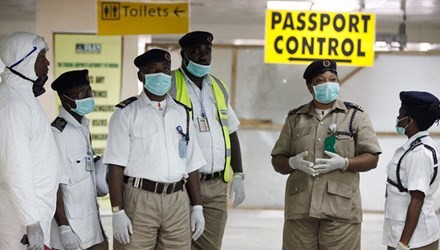(VOVworld) – There is new hope in the fight against Ebola. Several West African countries have been declared Ebola-free by the World Health Organization (WHO), and the first batches of experimental vaccines against the virus show promising signs. But more financial and human resources are needed to continue the fight, which is a long way from halting the epidemic.
The WHO says Ebola has killed more than 4,500 people since the first case was detected in March. The number of infected people in West Africa has surpassed 9,200 and the virus is spreading to other countries outside West Africa. Fatalities are mounting in Liberia, Sierra Leone, and Guinea. In the US, two people have tested positive for Ebola, both of them nurses who cared for a Liberian patient who has already died of Ebola in Texas. Spain, the first European country to see a confirmed case of Ebola, is stepping up efforts to isolate suspected cases.
Initial positive results
There are hopeful signs in the fight against the virus. An experimental Ebola vaccine being tested on humans in Canada looks promising. First batches of 800 vials of the experimental vaccine have already been sent to the WHO in Geneva. Russia and Thailand think they can produce new vaccines to prevent Ebola in the next few months. Nigeria was confirmed Ebola-free by WHO on Monday.

Nigeria tightens health monitoring at airports. Photo: BBC
|
Earlier, Senegal was the first West African country confirmed Ebola-free for 42 days as of October 18th. In Spain the health of the first patient infected with Ebola outside West Africa is improving. In the United States, an Ebola-infected Vietnamese-US nurse is also showing positive signs.
The world is stepping up efforts to fight Ebola
Since the Ebola epidemic broke out, the international community headed by the UK and the US, has spared no effort to support infected countries and prevent the virus’s transmission, but has failed to meet optimal expectations. With the number of new cases rapidly multiplying, the WHO has admitted its failure to predict the epidemic’s scope.
In addition to tight control over the virus’s international transmission, and financial support commitments, countries have pledged to send hundreds of soldiers and medical staff to epidemic zones to curb the virus’s local spread. The US has set up a 30-person unit to deal with the epidemic within the US.
Putting differences aside, Cuba has said it is willing to cooperate with the US in the fight against Ebola by sending 165 doctors and nurses to Sierra Leone. Cuba plans to send another 296 doctors and nurses soon to help Liberia and Guinea. Many countries have made plans to enhance heath monitoring at airports and seaports and quarantine passengers arriving from epidemic zones to prevent the virus’s spreading.
Realizing financial and humanitarian commitments
The WHO believes it will be weeks or even months - before the Ebola epidemic is under control. In the meantime, it’s critical to stop the virus’s spreading to other countries. To do this, the world needs more resources, especially money. Unfortunately, the UN and other relief organizations are receiving too little for this cause, just 30% of what is needed. In her “Letter to the World”, Liberian President Ellen Johnson Sirleaf warned that the Ebola epidemic is causing not only a health crisis, but also an economic disaster in West Africa, creating a lost generation of young people in the hardest hit countries.
UNICEF statistics indicate that at least 3,700 children in Liberia, Guinea, and Sierra Leone have lost one or both parents since the epidemic broke out in March. President Sirleaf said this epidemic recognizes no border and demands stronger action from the world community. Delayed action or a shortfall of contributions could make the epidemic a global disaster.